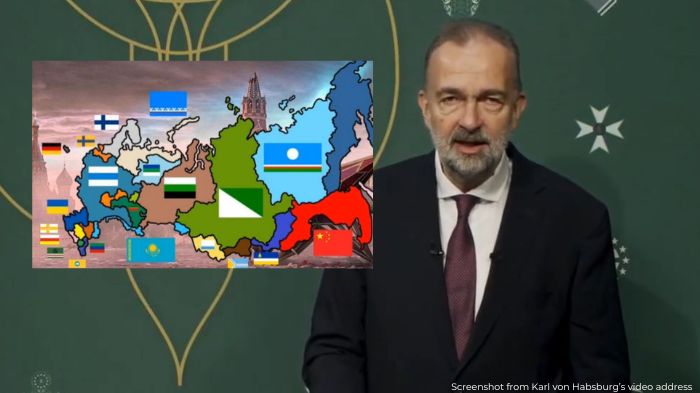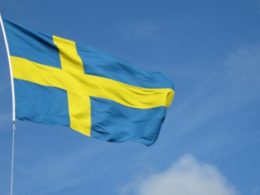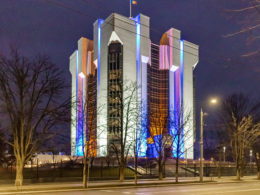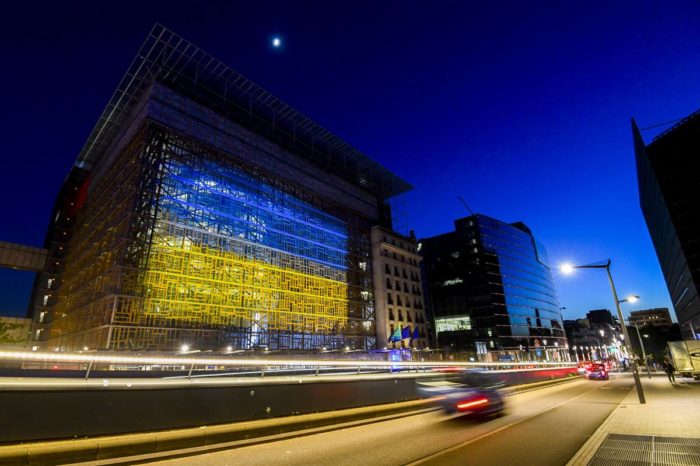Karl von Habsburg, head of the historic Habsburg-Lorraine dynasty and Honorary President of the Pan-European Movement Austria, called on Europe to prepare for a "crumbling Moscow colonial empire" and called for increased support for Ukraine in his annual speech on Europe's future.
The heir to one of Europe's most influential royal houses emphasized that Europe must prepare for Russia's collapse despite no signs of this happening. Assad's collapse was also unpredictable one year ago, and yet the Syrian dictator has now fled to Moscow, Karl von Habsburg reminded.
"Moscow is a colonial empire"
"Today's Russia is actually a very classic colonial empire, ruled by Moscow. This begins with the economic exploitation of the colonies and continues with the oppression of the peoples of this colonial empire, even to the attempt to use their men as cannon fodder in the colonial war against Ukraine," Habsburg said during his address "Integrity. Direction. Hope" on 11 January 2025.
Habsburg referred to a Ukrainian participant's perspective during the Post War Russia Forum in Vienna, where the Pan-European Movement also participated: "big Russia brings big problems, small Russia causes small problems." He urged Europe to begin developing scenarios for a potential fragmentation of the Moscow-centered state, noting that even China "is considering scenarios for how to secure certain areas in today's Russian Federation if this empire falls apart."
Habsburg made Ukraine a central part of his speech, stressing that the war to conquer Ukraine is not just Putin's war, but supported by Russians.
The Pan-European Movement leader emphasized that "imperialism is [...] not just a character trait of Putin, but is deeply rooted in Russian society," citing recent polls showing that while Russians may support peace with Ukraine, this support diminishes when discussing the return of occupied territories.
In a particularly pointed moment, Habsburg invoked the Nuremberg War Crimes Tribunal, quoting the Soviet prosecution's statement about German collective responsibility:
"All Germans are to blame for the crimes of Germans, on a level with the leadership of the country – because it was they who chose and did not stop their government when it committed a crime against humanity."
While expressing skepticism about collective guilt theories, Habsburg suggested this historical perspective should be considered when examining today's Russia.
Europe needs a "big stick", Ukraine needs unrestricted military support
Habsburg lambasted Europe's weak response to Russia's aggression, drawing direct parallels between current events and the historical appeasement of Hitler and noting that in 1938,
"Hitler marched into Austria and annexed the country. The rest of the world applauded. Only Mexico protested."
He argued that similar patterns emerged with Putin:
"He invaded parts of Georgia and took territory from the country. He invaded and annexed Crimea. The rest of the world took note."
Habsburg made a forceful case for unrestricted military support to Ukraine, arguing that current limitations are counterproductive. "Ukraine must be given the opportunity to destroy the bases from which the tyrant in Moscow is attacking the civilian infrastructure," he stated.
The Pan-European Movement head criticized Europe's hesitant approach: "Diplomatic protest that is not accompanied by measures only leads to further escalation on the part of the aggressor." He emphasized that
"all those who want to see Europe as a continent of freedom and who want to preserve the Western community of values for future generations have a clear duty to give Ukraine what it needs to defeat the Russian military and its allies."
Habsburg also addressed the need to allow Ukraine full use of provided weapons without restrictions to destroy bases from which Russia attacks Ukrainian civilian infrastructure, arguing that "regimes like Putin's only understand strength and determination, with clear meaning. Soft tones without a big stick only encourage these regimes – and I don't just mean the one in Moscow – to carry out further aggression."
"There is only one country in this war that is constantly escalating, and that country is Russia,"
Habsburg said, pushing back fears that support for Ukraine would be perceived as "escalation" by Russia.
The biggest threat from Moscow against Europe is the "disinformation war," whose aim is to make people not believe anything at all, Habsburg said.
"This is nothing new. Even during the Cold War and before that in the Tsarist era, Moscow ran massive disinformation campaigns to undermine Europe. Moscow has improved and expanded this expertise and also combined it with the new technical possibilities of social media."
Beyond social media, Russia's influence extends into European institutions, he warned.
"We have political parties that openly propagate Putin's propaganda. Journalists and commentators also regularly write in various established media whose support for Moscow is unmistakable. This fifth column of Moscow extends into the academic world."
The speech concluded with a call for unified European action, emphasizing that "all those who want to see Europe as a continent of freedom and who want to preserve the Western community of values for future generations have a clear duty to give Ukraine what it needs to defeat the Russian military and its allies."
The Pan-European Movement, founded in 1923 by Count Richard von Coudenhove-Kalergi in the aftermath of World War I, is one of Europe's oldest organizations advocating for continental unity. The movement received early support from prominent figures including Albert Einstein and Thomas Mann, and gained significant influence when Otto von Habsburg, Karl's father and the last Crown Prince of Austria-Hungary, became a leading figure after World War II. Today, Karl von Habsburg continues this legacy, leading an organization that promotes European integration based on shared cultural values, democratic principles, and economic cooperation.
Related:





